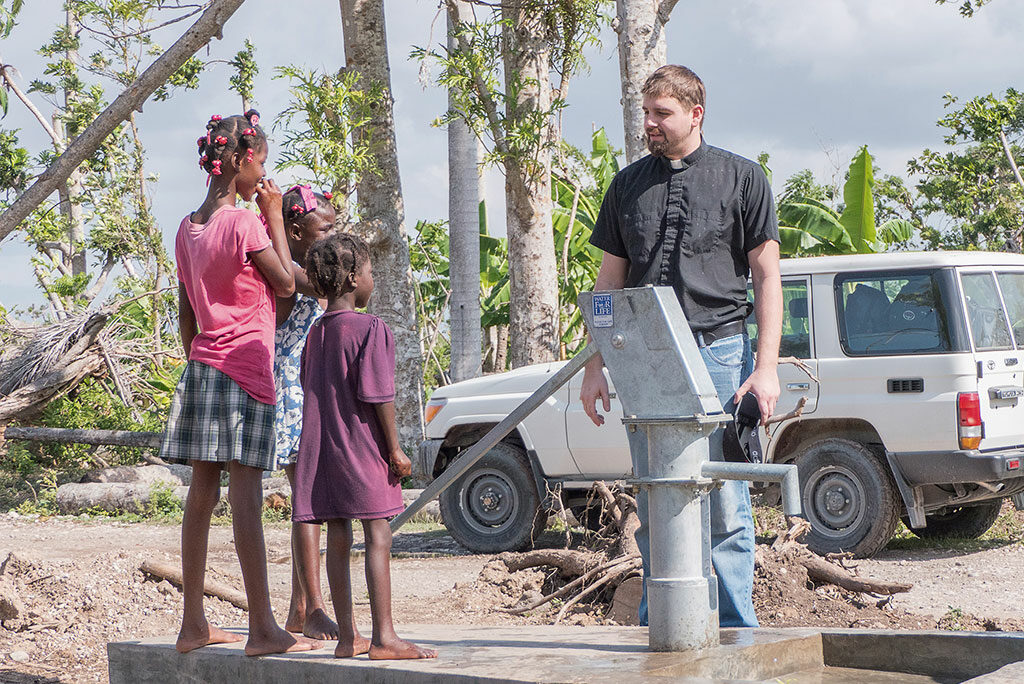
By Kim Plummer Krull
A father thankful he can give his child “water to drink that won’t make him sick.”
A pastor whose new roof better equips him to care for his congregation and community and to preach the Gospel.
Those are just two of the people “who were constantly coming up and thanking us,” said the Rev. Ross Johnson, director of LCMS Disaster Response, after returning from Haiti in mid-February to check on recovery since Hurricane Matthew ravaged the poorest region in one of the Western Hemisphere’s poorest countries.
The area of devastation in Haiti’s southern Tiburon Peninsula is also home to the greatest concentration of Lutheran congregations — “congregations that are the hub for much of the charitable work in Haiti, the feeding programs, the orphanages and other children’s programs,” Johnson said. “Helping the pastors and their families get back on their feet means they can get back to helping others.”
The Oct. 4 Category 4 hurricane has disappeared from news headlines in the United States. But in Haiti, mercy work made possible by donors contributing to LCMS Disaster Response continues to fuel recovery from the horrific storm that killed more than 500 people and displaced some 175,500, according to reports — creating what’s been called the country’s largest humanitarian emergency since the 2010 earthquake.
Rebuilding roofs, providing clean water
Immediately after the hurricane, LCMS Disaster Response provided emergency food and medical supplies. More recently the primary focus is on rebuilding roofs on the homes of some 50 pastors and drilling 10 wells deep enough to ensure water free from contamination that causes diseases like cholera — always a challenge in Haiti, Johnson said, but especially following a hurricane.
To work as efficiently as possible, Disaster Response is partnering with trusted nonprofits and LCMS Recognized Service Organizations (RSOs) “that have years of experience and expertise of doing ministry in Haiti, who understand the culture, the government,” said Johnson, who previously traveled to Haiti in October to assess needs.
One partner RSO is Ministry In Mission, which has grown from work begun in 2007 in Haiti by St. Mark Lutheran Church, Chesterland, Ohio.
Jackie Rychel, Ministry In Mission president; Johnson; the Rev. Paul Toulotte, Southern District president for the Evangelical Lutheran Church of Haiti; and the Rev. Jacob Deal, pastor of Saints Peter and Paul Evangelical Lutheran Church, Sharon, Pa., met with Haitian pastors — including several who “initially resisted” when they learned their damaged homes would get new tin roofs.
“These are men who share everything. If they have a bit of food, they will share it with 40 or 50 people,” said Rychel, explaining that while the 2010 quake killed more people, Hurricane Matthew devastated a part of the country that produces much of Haiti’s food and livestock supplies.
Breaking down barriers
Johnson also checked on the installation of the first three deep-water wells, all located within easy walking distance of a Lutheran church.
Children as well as older adults gathered at the wells. In broken English, a pastor thanked Johnson “for taking care of my community.”
Along with providing safe drinking water, the wells “break down barriers that non-churched Haitians have against the Gospel,” Johnson said, helping them “see that Lutherans care about them spiritually with the Gospel and that [Lutherans] care for their most basic human needs, both which voodoo cannot provide.”
Drilled 150 feet deep, the wells are installed by Water for Life, a nonprofit “working at a steep discount,” Johnson said, “to stretch donor dollars as wisely and as far as possible.”
The wells “will help fight cholera for years to come,” he said of work funded by a $50,000 grant from Disaster Response, made possible by LCMS donors, to Water for Life.
Other grants from LCMS Disaster Response for Hurricane Matthew recovery include:
- a total of $80,000 in grants to Ministry In Mission for emergency food and medicine and roofs for pastors’ homes.
- a total of $18,500 in grants to Mission: Haiti, an RSO affiliated with the LCMS Florida-Georgia District. The majority of those dollars helped buy 1,000 laying hens and coops for a long-term sustainable food project.
More opportunities to strengthen ‘great work’
Johnson says he was “overwhelmed with the great work” in Haiti and “the efficiency and the accountability in meeting essential human needs through Lutheran congregations.”
He also sees more opportunities — including to repair or rebuild as many as possible of the 50 Lutheran churches scattered throughout the hard-hit peninsula and to install more deep-water wells.
Each village church would cost about $10,000 to repair or rebuild “in a humble manner,” Johnson says, and each new well costs about $5,000.
Many Americans may not realize how Haitian Lutheran churches serve in ways that extend beyond worship, says Rychel, including for “schools, workshops, for social reasons and sometimes even centers for shelter and protection.”
“In Haiti, the churches are everything,” she said.
You can share Christ’s love when disasters strike.
Learn more about Disaster Response by visiting lcms.org/disaster or by contacting a Mission Advancement representative at 888-930-4438.
Donate:
- by making a check payable to “The Lutheran Church—Missouri Synod” (or LCMS), noting “Disaster Response/Relief” on the memo line. Mail to: LCMS, P.O. Box 66861, St. Louis, MO 63166-6861.
- online at lcms.org/givenow/disaster.
- by phone at 888-930-4438.
Volunteer after disasters in the United States, as needed, by contacting district disaster coordinators through LCMS district offices.
Kim Plummer Krull (kimkrull@sbcglobal.net) is a freelance writer and a member of St. Paul’s Lutheran Church, Des Peres, Mo.
Posted April 5, 2017